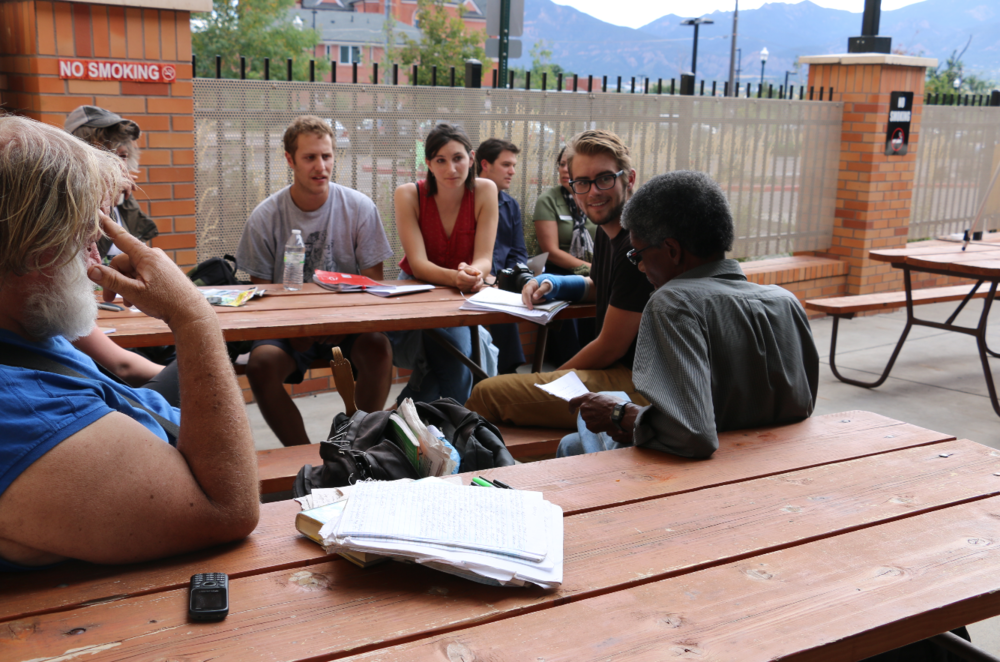True Grits
By Andrew Kenney
After a local soup kitchen closed, Colorado College students launched a publication to nourish the area’s homeless community.
Three Colorado College students have put the words and art of homeless people in print—and in the hands of the 36,000 readers of the Colorado Springs Independent.
The first edition of Grits Collective included the poetry of Donald Batey, the artwork of a man called Nobody, and Johna Stoth’s story about the Golden Rule.
The team behind Grits—Paige Clark, Ben Criswell, and Caitlin Canty—came up with their idea as an entry in a school contest. After the closure of Colorado College’s soup kitchen in 2014, the school’s Food Coalition and Arts for Social Change offered $20,000 for student projects involving homelessness through a Soup Project Challenge.
“At the time, we were 20 years old,” Clark said. “We were really excited about the possibility of the seed funding, and we were really getting all these ideas—maybe we could buy a house, and maybe we … could work with youth.”
But as they hashed out their ideas, they zeroed in on one less tangible, yet perhaps more attainable.
“How many homeless people do you see in Colorado Springs every day, versus how many do you actually talk to?” Canty asked. She and her friends wanted to create something, together, with people experiencing homelessness.
“The closing of the soup kitchen at Colorado College wasn’t so much a tragedy for the provision of food, but a tragedy for the loss of the community,” she explained.
 Colorado College students lead a writing workshop. Photo courtesy of Grits.Grits Collective and three other student proposals—for a mobile meals truck, day center programs, and art events—presented their ideas before potential funders. The pitches went over so well that one donor’s commitment doubled, allowing all the projects to be funded.
Colorado College students lead a writing workshop. Photo courtesy of Grits.Grits Collective and three other student proposals—for a mobile meals truck, day center programs, and art events—presented their ideas before potential funders. The pitches went over so well that one donor’s commitment doubled, allowing all the projects to be funded.
Grits Collective got $13,500 and set to work. They headed first to the Marian House, a services center in downtown Colorado Springs.
There they established a “tabling” routine, setting up a station where people could record interviews or write out their thoughts, sometimes in response to prompts. Their sign said it all: “Grits: A Publication for Community Nourishment.”
Those early conversations were enlightening and challenging. They drew inspiration from StoryCorps, the nonprofit radio program that focuses on the power of ordinary people’s stories.
“It’s definitely hard to completely relate with some of the people that we’re interviewing, just because we’re coming to that conversation from such a privileged and academic context,” Criswell said. Yet “… as soon as you start having a conversation, you start connecting and hearing things you relate to.”
Some interviewees waited for the students’ questions. Others poured out their thoughts. The results would be published in video, poetry, and prose.
“Apparently, there are many who are in the same sort of ‘boat’ that I am. Skilled, experienced, intelligent, hard working people who, for many reasons I imagine, have lost a job and cannot find jobs that would sustain a re-entry back into society,” reads a piece based on an interview with Tyrone Hunter.
The students, meanwhile, were developing a relationship with the staff of the Colorado Springs Independent, the weekly newspaper. They came to an arrangement where Grits would pay a significantly discounted rate to have its content inserted quarterly, the students said.
“I was really shocked when they agreed to do it. We kind of just showed up one day and told them about this idea we had,” Clark said. “They loved it—they told us they thought it was a great idea.”
And the newspaper staff got involved in far more than simply printing Grits. They asked hard questions, gave criticism, and vastly improved the print layout of the publication-to-be.
“We tried really hard,” at graphic design, Canty said. “They made it way prettier for us.”
The founders also have plans to expand into podcasting, and their project was featured on KRCC’s The Big Something radio program.
As it grows, the publication will face larger questions. For example, the group currently doesn’t pay contributors, and it sets aside a stipend only for its intern. The students hope the project can eventually provide financial support for its contributors.
There’s also the matter of who will lead it next school year. Grits already has 20 volunteers and counting, but all three of its founders are set to graduate after this semester.
The trio hails from Oregon, Oklahoma, and Massachusetts, so it’s possible none will be in the area. They hope that their intern, Reed Young, and their volunteers will bridge the gap. They also have the three other projects born from the end of the soup kitchen. Even during the funding challenge, the groups exchanged ideas and tried to band together.
Now it’s not unusual for this new crop of student leaders to bandy about plans for collaboration. Perhaps, for example, the mobile meals truck could be an interviewing station too.
And even beyond Colorado Springs, the trio hopes, the story of Grits Collective may ring true.
“I think it’s kind of a dream of ours to keep spreading it,” Clark said, “wherever we end up.”■
